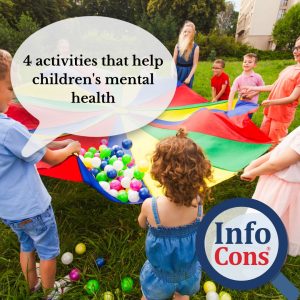4 Activities that Help Children’s Mental Health Children’s mental health is essential for their harmonious development and to ensure a bright future. In an increasingly busy and challenging world, it is important to focus on activities that can support the mental well-being of children. Here are four essential activities that contribute to children’s mental health:
- Regular Physical Activities Physical exercises are not only beneficial for physical health but also have a significant impact on mental health. Physical activities help release endorphins, also known as “happiness hormones,” which reduce stress and improve mood.
Examples of activities:
- Team sports: Soccer, basketball, volleyball – these activities not only improve physical fitness but also encourage socialization and teamwork.
- Dancing: Besides being a form of exercise, dancing allows children to express their emotions in a creative way.
- Nature walks: Excursions and walks in parks or forests can have a calming and relaxing effect.
- Games and Creative Activities Creativity plays a crucial role in children’s mental development, providing them with opportunities to express their thoughts and feelings in a constructive manner.
Examples of activities:
- Drawing and painting: These activities allow children to express emotions and develop their imagination.
- LEGO constructions or other building sets: These games develop cognitive skills and help focus attention.
- Writing and storytelling: Encouraging children to write stories or create personal journals can improve their communication skills and help them manage their emotions.
- Meditation and Mindfulness Meditation and mindfulness practices are recognized for their benefits in reducing stress and anxiety, even in children. These activities help them become more self-aware and better manage their emotions.
Examples of activities:
Breathing exercises: Teach children simple deep breathing techniques to help them calm down in stressful situations.
- Guided meditation: There are numerous online resources and apps offering guided meditations for children, helping them relax and focus.
- Attention games: Activities that involve focusing on sounds, objects, or sensations can help children develop attention and concentration skills.
- Family Time Positive interactions with family members are fundamental for children’s healthy development. Spending time together as a family provides children with a sense of security and belonging, which is essential for their mental well-being.
Examples of activities:
- Family dinners: Regular meals together provide an excellent opportunity for open discussions and strengthening family bonds.
- Board games: Playing board games or other communal activities strengthens bonds and promotes cooperation and communication.
- Joint projects: Participating in joint projects such as gardening, cooking, or volunteering activities strengthens the sense of collaboration and solidarity.
By incorporating these activities into daily life, we can significantly contribute to improving the mental health of our children, preparing them to face future challenges with confidence and resilience.
Source: WHO
